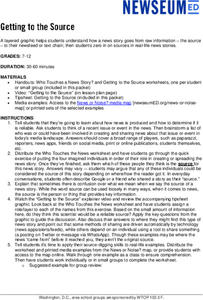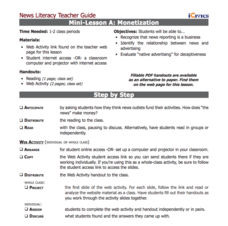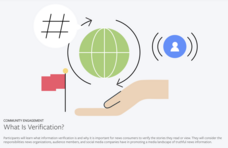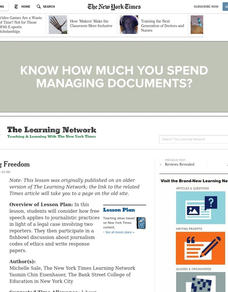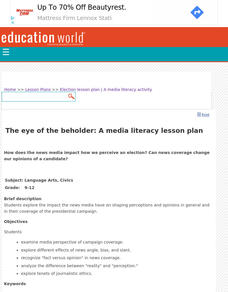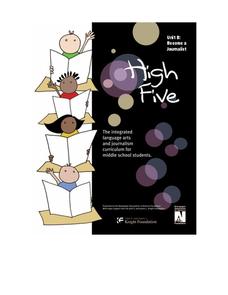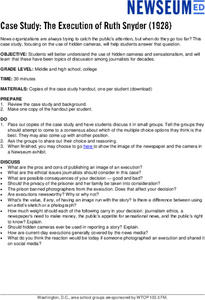Newseum
Use ‘War of the Worlds’ to Teach Media Literacy
Orson Welles' 1938 radio broadcast of "War of the Worlds" is the focus of a lesson that looks at the importance of clarity in broadcasting. After listening to the radio broadcast, class members discuss the ethical obligations to...
iCivics
Lesson 1: Journalism
Extra! Extra! Do your pupils know what it takes to be a good journalist? Young news hounds explore the world of journalism through a series of activities that focus on ethical reporting. Learners read, evaluate, and investigate popular...
iCivics
Lesson 3: Bias
How do journalists balance bias and ethical reporting? The final lesson in a series of five from iCivics examines the different types of bias and how they affect the news we read. Young reporters take to the Internet to find examples of...
Newseum
Getting to the Source
Reliable news stories are based on facts from reliable sources. Young journalists learn how to evaluate the reliability of news sources by watching a short explainer video. Teams apply their new source-digging skills to a current news...
Newseum
Is This Story Share-Worthy?
Young journalists use a "Is This Story Share-Worthy?" flowchart graphic to decide whether a story is worth sharing online. Instructors provide groups with fake news, poor quality stories, opinion pieces, biased news, and high-quality...
Curated OER
Is It Ethical to Eat Meat?
Have your class join a blog about whether or not eating meat is good for you. They'll read several passages regarding meat processing and consumption, then they post what they think. There are six critical-thinking prompts to help them...
Media Smarts
Bias
See how bias operates firsthand. Half of the class reads one article while the other half reads another article on the same event. The obvious differences emerge when the two sides talk about their observations though. Several handouts...
Curated OER
Freedoms of the Press
Young scholars examine journalism ethics. In this journalism lesson, students complete a think, pair, share activity about the journalistic code of ethics. Young scholars then discuss an ethics scenario.
Curated OER
Shaping the News
High schoolers explore television journalism. In this journalism lesson, students discuss the attributes of television broadcasting. High schoolers then review their journalism code of ethics and then conduct research for stories that...
Social Media Toolbox
Law Review
How can your journalism class ensure they use social media responsibly and legally? The sixth lesson in a 16-part Social Media Toolbox series asks pupils to dig deep into the legal aspects of social media use by school publications....
News Literacy Project
News Goggles: Newsroom Lingo Review
Learn how to talk like a journalist. Throw around jargon like "lede" and "nut graf." A 20-slide presentation introduces viewers to words and phrases heard in the fast-paced newsroom.
Curated OER
Citizen Journalism
Students examine the role of citizen journalism, freedom of the press, and the First Amendment. They analyze the results of an Internet survey, discuss the ethics of downloading copyrighted material on the Internet, and write a news story.
iCivics
Mini Lesson A: Monetization
Advertising is everywhere! Does your class know that their attention span is for sale, even when they're watching a simple news story? The second installment in a five-part series from iCivics examines the relationship between news...
Facebook
What Is Verification?
One of the most important skills news consumers and social media users must develop is the ability to determine the veracity of stories they read or view. Here's an interactive lesson plan that teaches high schoolers how to verify news...
Newseum
Bias Through History: Analyzing Historical Sources
Young journalists use the E.S.C.A.P.E. (evidence, source, context, audience, purpose, and execution) strategy to evaluate historical and contemporary examples of bias in the news. The class then uses the provided discussion questions to...
Curated OER
Press-ing Freedom
Students consider how free speech applies to journalistic practices in light of a legal case involving two reporters. They participate in a fishbowl discussion about journalism codes of ethics and write response papers.
Curated OER
Teaching Ethical Situations
Learners use journalism ethics standards to learn how to write ethically correct news stories. For this journalism and ethics lesson, students review journalism standards for ethics. Learners use the standards as they analyze example...
CK-12 Foundation
Journalism 101
How do people express their rights of free expression through the press? Journalism 101 is the perfect combination of modules for 11th and 12th graders to learn about First Amendment rights, reporting and writing skills, digital...
Facebook
Versions of Media Texts
Verification of provenance and the original source of an image or video can be a long and winding process. Young journalists learn about the difficulty of finding the original source of a scrape, a copy of an original news story, and...
Curated OER
The Eye of the Beholder: A Media Literacy Activity
Students explore the impact the news media have on shaping perceptions and opinions in general and in their coverage of the presidential campaign.
American Press Institute
In the Newsroom: The Fairness Formula
Reporting the news is easy, right? Think again! Show young scholars the difficult choices journalists make every day through a lesson that includes reading, writing, and discussion elements. Individuals compare the language and sources...
Online Publications
Become a Journalist
Explore the newspaper as a unique entity with a detailed and extended unit. The unit requires learners to consider the newspaper's role in democracy, think about ethics, practice writing and interviewing, and examine advertising and news...
Social Media Toolbox
Verification
When you're putting together a great story, you've got to consider the source! Scholars discover the dangers of errors in reporting during the 14th activity in a 16-part Social Media Toolbox series. Groups collaborate to create a source...
Newseum
Case Study: The Execution of Ruth Snyder (1928)
The case of the 1928 execution of Ruth Snyder takes center stage in a lesson that asks young journalists to consider the ethics involved in publishing an image of an execution. A series of discussion questions ask individuals how they...





